
Politics of Bangladesh takes place in a framework of a parliamentary representative democratic republic, whereby the Prime Minister of Bangladesh is the head of government and of a multi-party system. Executive power is exercised by the government. Legislative power is vested in both the government and parliament. The Constitution of Bangladesh was written in 1972 and has undergone seventeen amendments.

Sheikh Mujibur Rahman, also known by the honorific Bangabandhu, was a Bangladeshi politician, revolutionary, statesman, activist and diarist, who was the founding leader of Bangladesh. As the leader of Bangladesh, he had held continuous positions either as Bangladesh's president or as its prime minister from April 1971 until his assassination in August 1975. His nationalist ideology, socio-political theories, and political doctrines are collectively known as Mujibism.
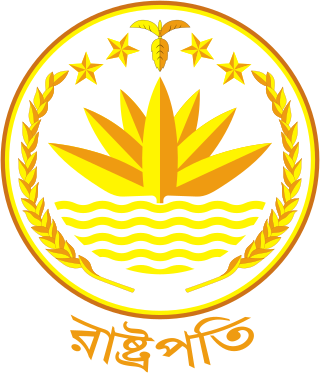
The president of Bangladesh (POB), officially the president of the People's Republic of Bangladesh, is the head of state of Bangladesh and commander-in-chief of the Bangladesh Armed Forces.
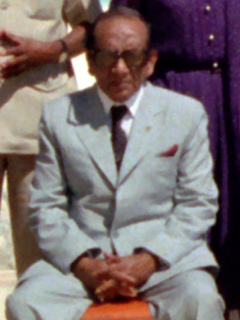
Abdus Sattar was a Bangladeshi statesman. A leader of the Bangladesh Nationalist Party (BNP), he served as the president of Bangladesh from 1981 to 1982, and earlier as the vice president. A jurist by profession, Abdus Sattar held numerous constitutional and political offices in British India, East Pakistan and Bangladesh. He was a cabinet minister, supreme court judge, and chief election commissioner. He took oath and became president shortly after the assassination of president Ziaur Rahman.

Kamal Hossain, better known as Dr. Kamal, is a founding leader, lawyer and politician of Bangladesh. He is known as the "Father of the Bangladeshi Constitution" and regarded as an icon of secular democracy in the Indian subcontinent. Hossain currently heads his own law firm in Dhaka. He retired from political activities and from the post of president of Gano Forum in October 2023.

Bangladesh has undergone several changes of government since the Proclamation of Independence in 1971. Between the first recorded uprising in August 1975 and the 2009 Bangladesh Rifles revolt, Bangladesh has been through as many as 29 military coups.
Abdur Rahman Biswas was a Bangladeshi politician. He was the President of Bangladesh from 1991 to 1996. Biswas represented Pakistan at the United Nations General Assembly, prior to the independence of Bangladesh.

Abul Hasnat Muhammad Qamaruzzaman was a Bangladeshi politician, government minister and one of the founding leader of Bangladesh. He was the Home Minister to Mujibnagar Government, Qamaruzzaman was murdered along with Syed Nazrul Islam, Muhammad Mansur Ali and Tajuddin Ahmed in the jail killings in Dhaka Central Jail on 3 November 1975 by a group of army officers on the instruction of President Mostaq.
Jail Killing Day is observed by the Awami League (AL) of Bangladesh and many other political organisations on 3 November every year. It commemorates the killing of four Awami League and national leaders: former vice-president Syed Nazrul Islam, former prime minister Tajuddin Ahmed and Captain (Rtd.) Mansur Ali, and former home minister A H M Quamruzzaman on this date in 1975.

Ataur Rahman Khan was a Bangladeshi lawyer, politician and writer, who served as the chief minister of East Pakistan from 1 September 1956 – March 1958, and as the prime minister of Bangladesh from 30 March 1984 to 1 January 1985.
Yar Mohammad Khan was one of the founders and the first treasurer of the Bangladesh Awami League, the main political party that eventually led Bangladesh's struggle for independence against the West Pakistan regime.

The Constituent Assembly of Bangladesh was the first and, to date, the only constitution-making body of Bangladesh, convened in 1972 by the government of Sheikh Mujibur Rahman following the country's independence. It comprised representatives elected in the national and provincial council elections of Pakistan held in 1970.
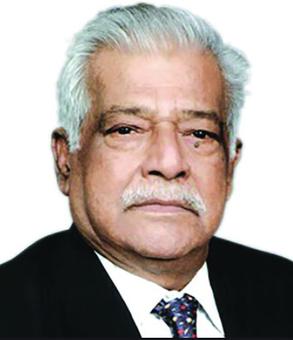
Khandakar Mohammad Obaidur Rahman was a Bangladeshi politician. He was a member of the Jatiya Sangsad in 1973 representing Bangladesh Awami League and in 1979, 1996 and 2001 representing the Bangladesh Nationalist Party (BNP).

Muhammad Yusuf Ali was a Bangladesh politician. He was the first minister for Education and Cultural Affairs in the first cabinet of Bangladesh.
Md Korban Ali was a Bangladesh Awami League politician and the former deputy Speaker of Parliament.
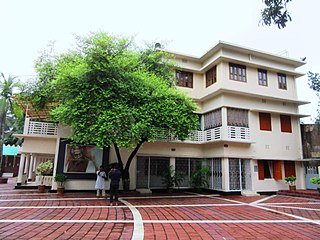
Tungipara Sheikh family of Tungipara is one of the two most prominent Bangladeshi political families, other being the Zia family. The family primarily consists of Sheikh Mujibur Rahman, Sheikh Hasina, Sheikh Rehana and their relatives. Their political involvement has traditionally revolved around the Bangladesh Awami League.
The 3 November coup d'état was organised by Brig. Khaled Mosharraf against President Khondaker Mostaq Ahmad to remove him from the presidency and the assassins of Sheikh Mujibur Rahman from power: Capt. Abdul Majed, Maj. Syed Faruque Rahman, Maj. Khandaker Abdur Rashid and Maj. Shariful Haque Dalim. The coup resulted a return of Mujibist forces in Bangladeshi politics for a short time.
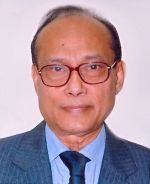
Nurul Islam Anu (Bengali: নূরুল ইসলাম অনু; 1939–2017), also known as A M Nurul Islam (Anu), was a Bangladeshi politician and bureaucrat. He started his career in the erstwhile Civil Services of Pakistan (C.S.P.) in 1963 and joined the Government of Bangladesh after independence in 1971. He was the private secretary to the former Prime Minister of Bangladesh Sheikh Mujibur Rahman (1972 to 1973). He was the longest-serving president of the U.S. chapter of Bangladesh Awami League (1989-2002).

Mohammed Shahabuddin natively known as Chuppu, is a Bangladeshi jurist, civil servant and politician who has served as the 16th and current president of Bangladesh since 2023. He was elected unopposed in the 2023 presidential election as the nominee of the ruling Awami League. Prior to his presidency, Shahabuddin served as a district and sessions judge and a commissioner of the Anti-Corruption Commission from 2011 to 2016.













